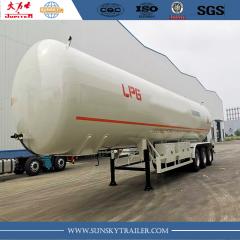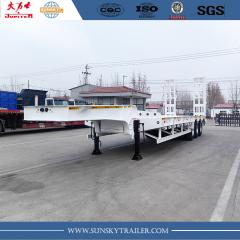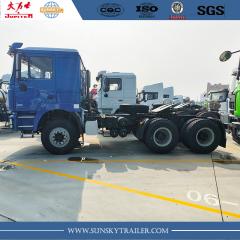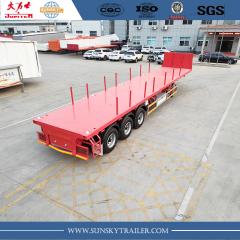-
 3 Axle Lpg Gas Tank Semi Trailer
3 Axle Lpg Gas Tank Semi Trailer
-
 Low Bed Trailer
Low Bed Trailer
-
 SHACMAN F3000 Tractor Truck
SHACMAN F3000 Tractor Truck
-
 Flatbed Pillar Trailer
Flatbed Pillar Trailer
SUNSKY VEHICLE, a manufacturer of flatbed semi-trailers, has found that the Flatbed Pillar Trailer i...
Maintaining your fleet is critical to ensuring that it lasts for many years. You may place a greater emphasis on truck maintenance, but trailers are equally important. You want to keep your customers happy and avoid any future problems that could be costly.
Let's take a look at the advantages of semi-trailer maintenance.
Why is it so important to maintain your semi-trailer?
Regular maintenance is necessary for any vehicle, from a car to a semi-trailer, to keep it running. You want to make sure that trailers are safe, fuel-efficient, comply with all regulations, and can spend as much time on the road as possible.
Regular inspections ensure that your trailer complies with regulations. The Federal Motor Carrier Safety Administration requires all operators to inspect, maintain, and repair their semi-trailers on a regular basis, so it's critical to stay current.
What is involved in semi-trailer maintenance?
Routine maintenance and repairs are an investment in your fleet's health and the viability of your company. Here are some of the things that should be checked on a regular basis:
Tires: Inspecting the tyres on a regular basis will save you money and time in the long run. This will also keep drivers safe. Before each trip, inspect the tyres for damage and leaks. Tire wear that is unusual could indicate a problem with the suspension or shock absorbers. As a result, inspecting the tyres before and after each trip, as well as during all service appointments, is critical.
Your tyres are critical for the efficient and timely movement of freight, but one or more busted tyres can result in an expensive and unexpected semi-truck trailer repair. You could save a lot of money and avoid a dangerous situation on the road by simply checking your tyres on a regular basis. As a driver, you should inspect your tyres prior to each trip to ensure that they are free of damage or leaks.
Lubrication: When applying lubricant to any of the semi trailer's parts, make sure to always follow the manufacturer's instructions. Failure to do so may result in more frequent repairs. Once every 12,000 to 24,000 miles, inspect the main rail, drag link, and kingpin.
Brakes are one of the first things that come to mind when reviewing a maintenance checklist and for good reason. They're necessary for the truck's security. Have them inspected according to the manufacturer's instructions. In most cases, the brakes can be checked whenever the truck needs an oil change.
Lights: Having working lights is critical to keeping your fleet safe. A single light that goes out can be a major problem. Fortunately, most light-related issues can be resolved quickly and inexpensively. Lights are a common target for violations, which is why you should check them before and after any long trip, as well as during any service appointments.
It's not just about locking the doors when it comes to security. Many mechanisms are included in semi-trailers to secure the freight, doors, and other loose components. Before each haul, make sure to inspect them.
Maintaining your fleet is critical to ensuring that it lasts for many years. You may place a greater emphasis on truck maintenance, but trailers are equally important. You want to keep your customers happy and avoid any future problems that could be costly.




